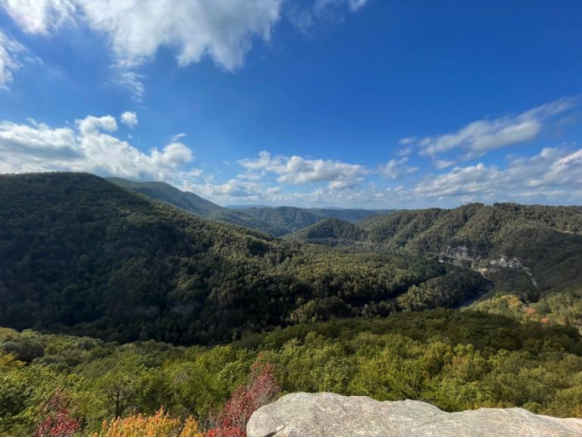Dust Cloud Disappear: Voices from the Appalachian Economic Transition in Southwest Virginia
- Student
- Sarah Kikel
- College(s)
- College of Arts and Letters
- Class Year
- 2022
Introduction

This past October, sponsored by Notre Dame’s Center for Social Concerns, I spent a week in southwest Virginia, along with eleven classmates, learning from individuals and organizations that are contributing to a just transition of Appalachia’s economy in Southwest Virginia. The following project is part-travelogue, part-vignette, and examines the role of documentary poetry in encapsulating a historical narrative of environmental progress, as Appalachia transitions from environmentally-destructive practices to an ecologically-sustainable economy.
In Appalachia, we were able to hear the stories of farmers, coal miners, and grassroots organizers. We met people who lived through the golden eras of the coal industry and young people who are working to produce new opportunities that will keep youth in the region—all of whom inspired me to reflect on their stories and consider how their regional efforts can be models for environmental change throughout our country.
Many of our society’s stereotypes about Appalachia are perpetuated by the national media, hungry for political controversy from polarizing regions. Political parties paint large-scale pictures that often contradict opinions held in communities and the relationships that are formed between groups that politics try to pit against each other. To stereotype Appalachia is to deny the existence of all these people and conceal their stories from being heard. My experiences in Appalachia have shown me that relationships in the region are much more complex and that the diversity of the region necessitates a variety of opinions on religious, political, and social values.
In the people’s encyclical, “The Telling Takes Us Home” (2015), Ched Myers paraphrases from Baba Dim, saying that “We won’t save the places we don’t love. We can’t love places we don’t know. We don’t know places we haven’t learned.” Traveling to Abingdon, Big Stone Gap, Damascus, Dante, Duffield, Emory, Haysi, Norton, St. Paul, and Wise, being there in person, walking their streets and seeing their struggles and achievements enlightened me far beyond what a textbook could convey. Learning directly from Anthony, Adam, Nick, Jessica, Robert, Mekyah, Robin, Yogev, Kathy, Bob, Dr. Ed, Austin, Larry, McKenna, Jim, Blake, Brad, Sharon, and Ms. Gullett, seeing them in action on the land that they love showed me the importance of saving the region and inspired me to work for environmental and social good in ways that written words could never capture.
When Dante returned from Paradise, he struggled to convey his experiences because:
1. his mortal senses prevented full intelligibility of his experiences in Heaven
2. his memory of the wondrous sights often failed him as he attempted to recall Heaven
3. he often struggled to find the words to describe Heaven
Appalachia, for me and countless others, is a paradise, that, like Dante, I cannot adequately describe, though I have tried to show that despite being wounded and grieving, her people are helping her heal. The process of repairing the region is long and arduous, but the Appalachian efforts are substantial, steadily building her up. Reflecting on the work in progress in Southwest Virginia has revealed to me its potential to inspire similar projects throughout Appalachia and in our country.
April 2022